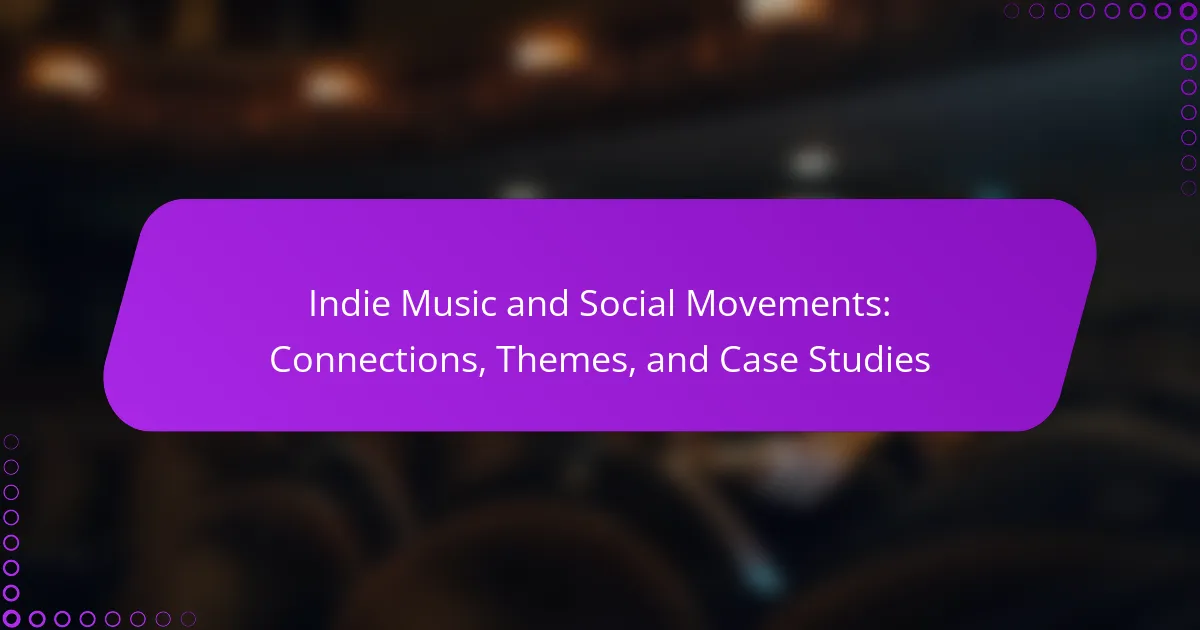Indie music plays a crucial role in social movements by amplifying marginalized voices and fostering grassroots activism. This article explores the connections between indie music and social justice themes, highlighting notable case studies like the Black Lives Matter movement. It examines how indie artists leverage their platforms for political expression and community engagement while addressing the challenges they face in activism. Additionally, the cultural influences shaping the impact of indie music on social movements will be discussed.
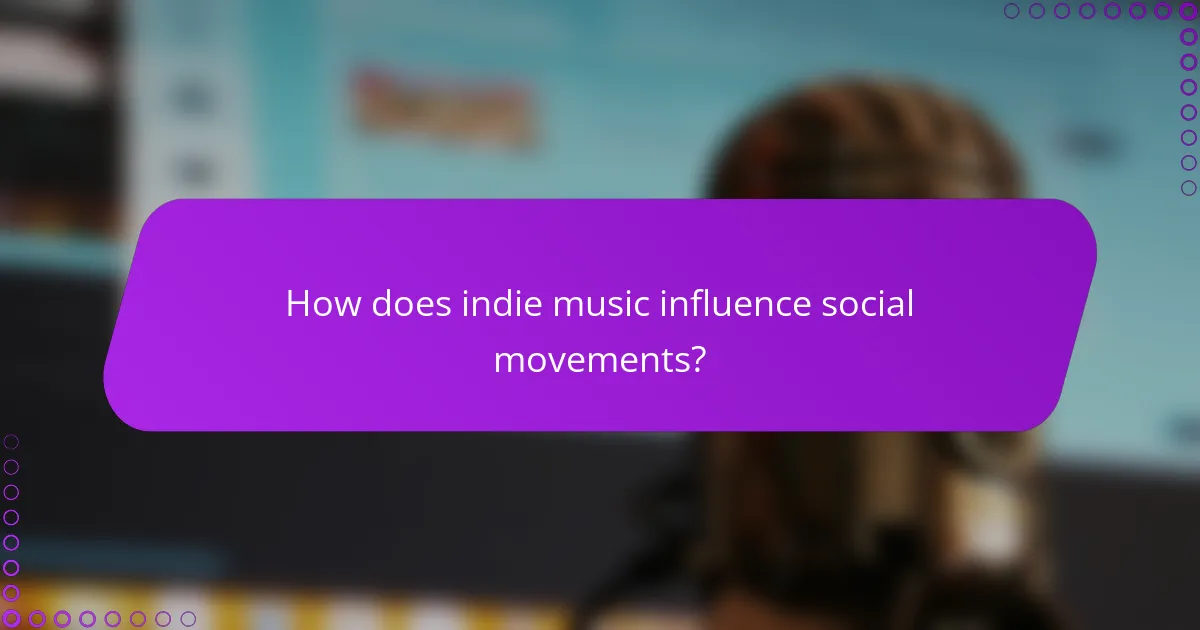
How does indie music influence social movements?
Indie music significantly influences social movements by providing a voice to marginalized communities and fostering grassroots activism. Its themes often address social justice, environmental issues, and political dissent, resonating with listeners and inspiring action.
One notable case is the rise of protest songs during the Black Lives Matter movement, where indie artists used their platforms to amplify calls for justice. Additionally, the DIY ethic of indie music encourages community engagement and collaboration, which can mobilize support for various causes.
The unique attribute of indie music lies in its diversity, reflecting a wide range of perspectives that enrich social discourse. As a result, indie music not only entertains but also serves as a catalyst for change, shaping cultural narratives and driving social progress.
What themes connect indie music and activism?
Indie music often intersects with activism through shared themes such as social justice, personal expression, and community engagement. Artists use their platforms to address issues like inequality and environmental concerns. This connection manifests in lyrics, performances, and collaborations that amplify marginalized voices. For example, many indie musicians participate in benefit concerts or social campaigns, reinforcing their commitment to activism. The unique attribute of indie music lies in its grassroots nature, fostering authentic connections between artists and their audiences.
Which social issues are commonly addressed in indie music?
Indie music commonly addresses social issues such as mental health, political activism, environmental concerns, and identity struggles. These themes resonate with audiences seeking authenticity and connection. For example, artists often use their platforms to raise awareness about social justice and promote change.
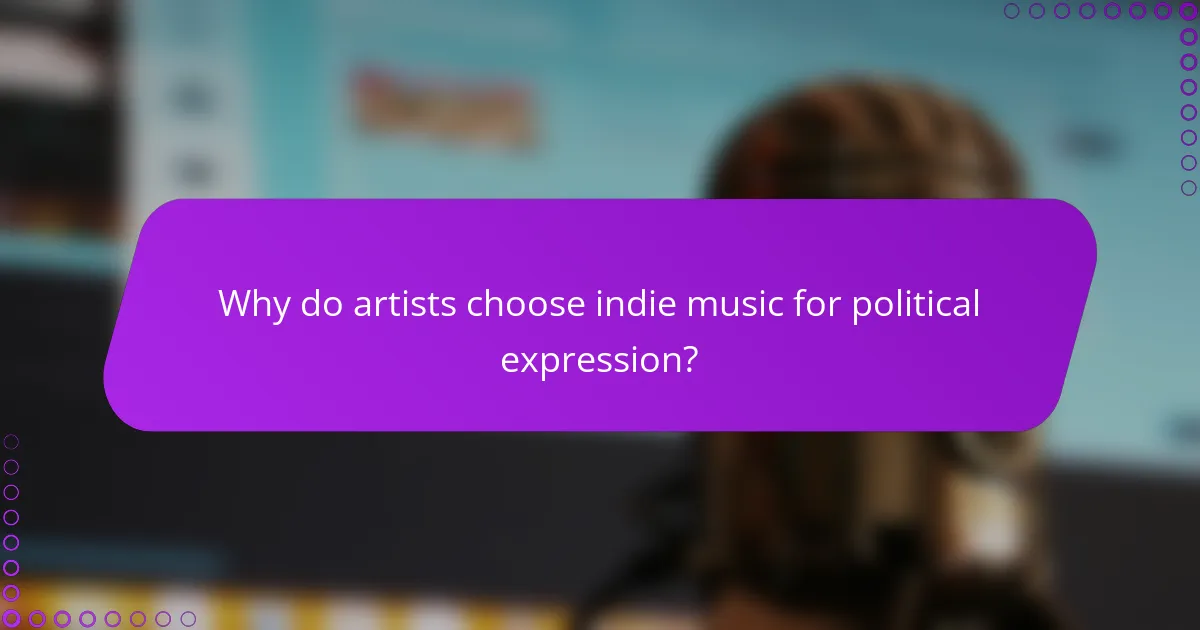
Why do artists choose indie music for political expression?
Artists choose indie music for political expression due to its creative freedom and grassroots appeal. Indie music allows artists to voice dissent and connect with social movements authentically. The genre often embraces themes of resistance and empowerment, making it a powerful tool for activism. For example, artists like Billie Eilish and Chance the Rapper have used their platforms to address issues like climate change and racial injustice, demonstrating the unique ability of indie music to resonate with contemporary social issues. This alignment with social movements enhances the emotional impact of their messages, fostering community engagement and mobilization.
What are the motivations behind indie musicians’ activism?
Indie musicians are often motivated by a desire for social change, personal expression, and community engagement. Their activism frequently stems from a commitment to issues such as environmental sustainability, human rights, and mental health awareness. For example, many indie artists use their platforms to raise awareness about climate change, leveraging their music to inspire action. Additionally, the indie music scene fosters a sense of collaboration and support among artists, amplifying their collective voice on social issues. This activism not only reflects their values but also connects them with audiences who share similar concerns, creating a powerful movement for change.
How does indie music serve as a platform for marginalized voices?
Indie music serves as a platform for marginalized voices by amplifying their stories and experiences. This genre often embraces themes of social justice and empowerment, allowing artists to challenge mainstream narratives. For instance, artists from underrepresented communities use indie music to express cultural identity and political dissent. As a result, indie music fosters a sense of belonging and solidarity among listeners who share similar struggles. Unique attributes of indie music include its DIY ethos, which encourages diverse voices to participate without corporate constraints.
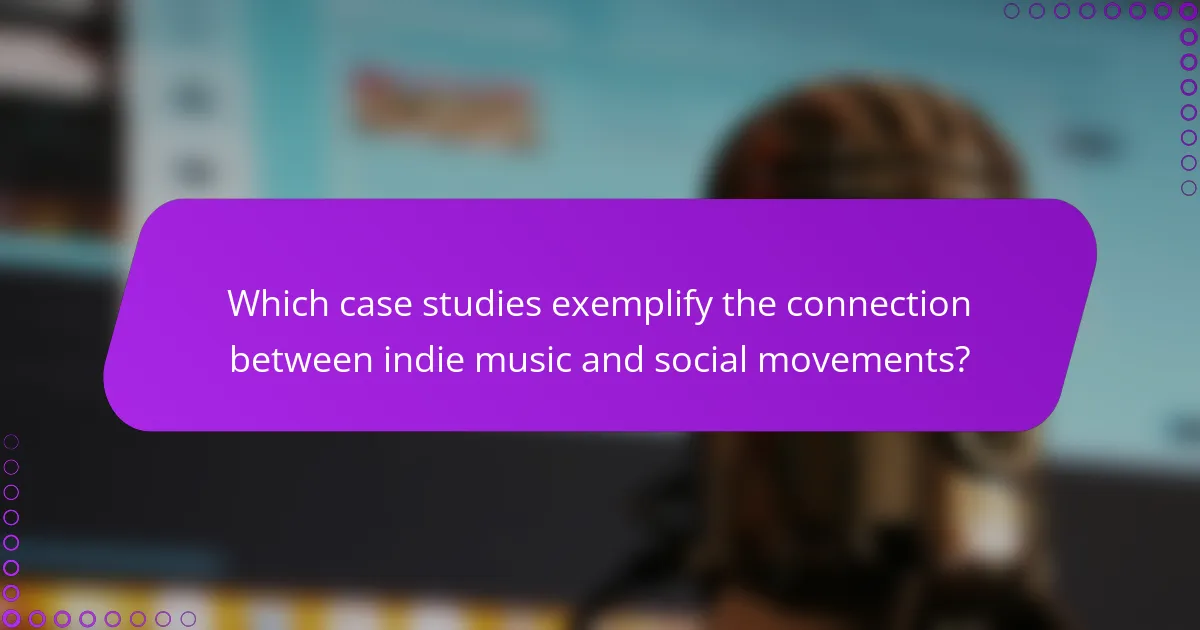
Which case studies exemplify the connection between indie music and social movements?
Case studies illustrating the link between indie music and social movements include the anti-establishment themes in punk rock during the 1970s, which fueled activism. The rise of indie artists like Billie Eilish has also highlighted mental health awareness, resonating with youth movements. Additionally, the support for Black Lives Matter by indie musicians has amplified social justice messages in recent years. These examples show how indie music can serve as a platform for advocacy and community engagement.
What role did specific indie artists play in recent social movements?
Indie artists have significantly influenced recent social movements by amplifying marginalized voices and promoting activism through their music. For example, artists like Hozier and Billie Eilish have addressed issues such as climate change and racial injustice, using their platforms to raise awareness and inspire action. Their unique attributes, such as personal storytelling and emotional authenticity, resonate deeply with audiences, creating a strong connection between music and social advocacy. Additionally, collaborative projects, like benefit concerts, showcase the rare ability of indie musicians to unite diverse communities around common causes.
How have indie music festivals contributed to social activism?
Indie music festivals have significantly advanced social activism by providing a platform for awareness and engagement. These events often feature artists who address social issues through their music, fostering community solidarity.
For example, festivals like Coachella and Bonnaroo have included initiatives supporting environmental causes and social justice. They encourage attendees to participate in activism, such as signing petitions or donating to charities.
Additionally, the unique atmosphere of indie festivals promotes grassroots movements, allowing local organizations to connect with a broader audience. This engagement can lead to increased visibility for social causes and inspire collective action among attendees.
In summary, indie music festivals serve as catalysts for social activism, blending entertainment with meaningful advocacy.
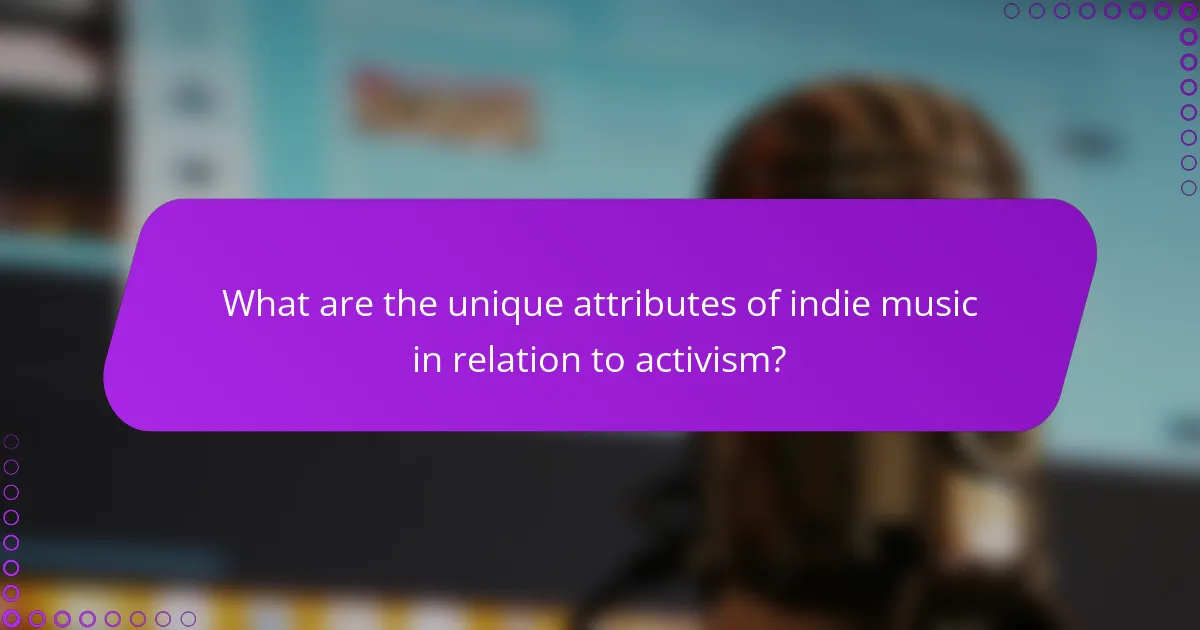
What are the unique attributes of indie music in relation to activism?
Indie music uniquely intertwines with activism through its emphasis on authenticity, grassroots movements, and social commentary. This genre often amplifies marginalized voices and addresses social issues, fostering community engagement. Notable examples include artists like Billie Eilish and her environmental advocacy, showcasing how indie musicians use their platforms for activism. Additionally, indie music festivals frequently promote causes, creating spaces for awareness and action.
How does the DIY ethic of indie music shape its political messages?
The DIY ethic of indie music fosters authentic political messages by promoting grassroots activism and individual expression. This approach encourages artists to address social issues directly, using their platforms to challenge mainstream narratives. Indie musicians often prioritize community engagement, leading to collaborations with local movements and causes. For instance, many indie labels support environmental initiatives, reflecting their commitment to social responsibility. The unique attribute of indie music lies in its ability to resonate with diverse audiences, making political messages more relatable and impactful.
Which indie subgenres are most associated with social movements?
Indie subgenres closely linked to social movements include punk, folk, hip-hop, and electronic music. Punk music often embodies anti-establishment sentiments, while folk music highlights social justice themes. Hip-hop serves as a platform for marginalized voices, and electronic music can promote awareness of various causes through its community-driven events. Each subgenre reflects unique attributes tied to specific movements, shaping cultural narratives and activism.
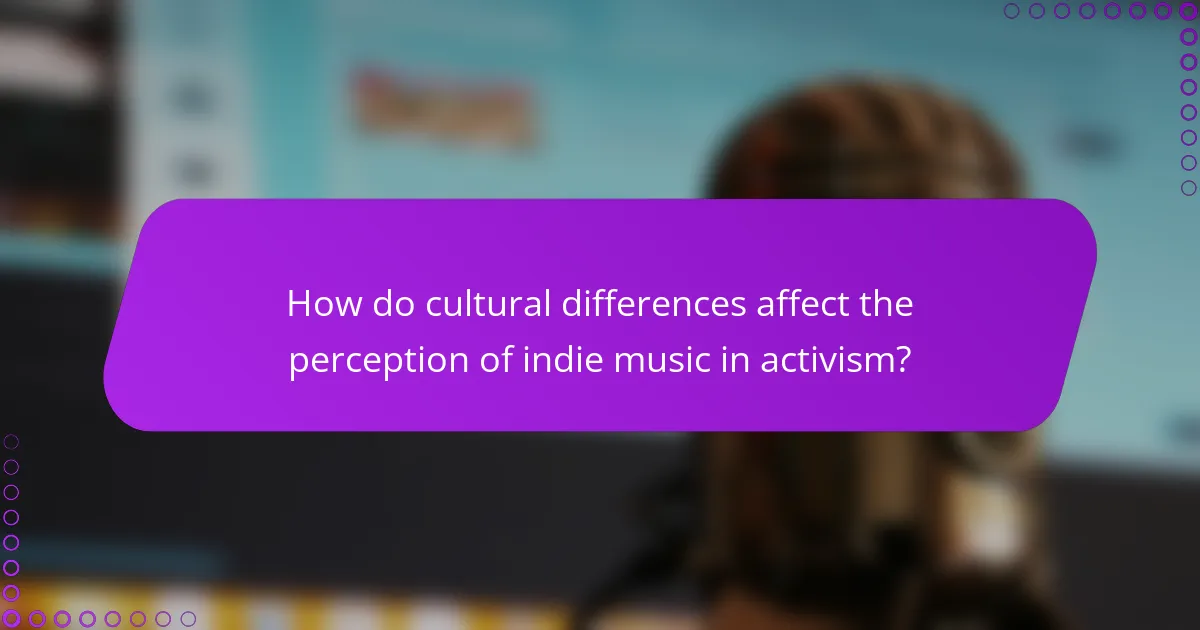
How do cultural differences affect the perception of indie music in activism?
Cultural differences significantly shape how indie music is perceived in activism. In various cultures, indie music often reflects local social issues, resonating differently with audiences. For instance, in Western contexts, indie music may emphasize individualism and personal expression, while in collectivist cultures, it might focus on community solidarity and shared struggles.
Moreover, the themes present in indie music can vary based on cultural values. In some regions, lyrics addressing political dissent may be celebrated, whereas in others, they could be met with resistance. Case studies show that indie artists often adapt their messages to align with cultural narratives, enhancing their impact on social movements.
The unique attributes of indie music, such as its DIY ethos and grassroots appeal, further influence its role in activism. This adaptability allows it to serve as a powerful tool for change across diverse cultural landscapes.
What are the regional variations in indie music’s role in social movements?
Indie music plays a varied role in social movements across different regions, reflecting local cultures and issues. In the United States, indie music often addresses themes of identity and activism, exemplified by artists like Phoebe Bridgers, who tackles mental health and social justice. In contrast, Latin American indie musicians frequently engage with political struggles, as seen in the works of bands like Los Bunkers, who address historical injustices and social inequality.
In Europe, indie music often intersects with environmental movements, with artists like Björk promoting sustainability. African indie scenes, such as those in Nigeria, use music to voice resistance against corruption and advocate for social change, as demonstrated by artists like Santi. These regional variations highlight how indie music adapts to local contexts while fostering community engagement and activism.
How do audience demographics influence the impact of indie music on activism?
Audience demographics significantly shape how indie music influences activism by tailoring messages to specific groups. Younger audiences often connect with themes of social justice and environmentalism, while older demographics may resonate with nostalgia and personal experiences.
Indie music’s ability to address diverse issues attracts varied listeners, creating a cross-generational dialogue. For instance, artists like Billie Eilish engage youth with climate change topics, while bands like The Decemberists appeal to older fans with historical narratives.
Additionally, geographic factors play a role; urban audiences may respond differently than rural listeners due to varying cultural contexts. This demographic diversity allows indie music to foster localized activism, adapting messages to community needs.
Ultimately, understanding audience demographics enhances the effectiveness of indie music as a tool for social change, ensuring that messages resonate deeply and mobilize action.
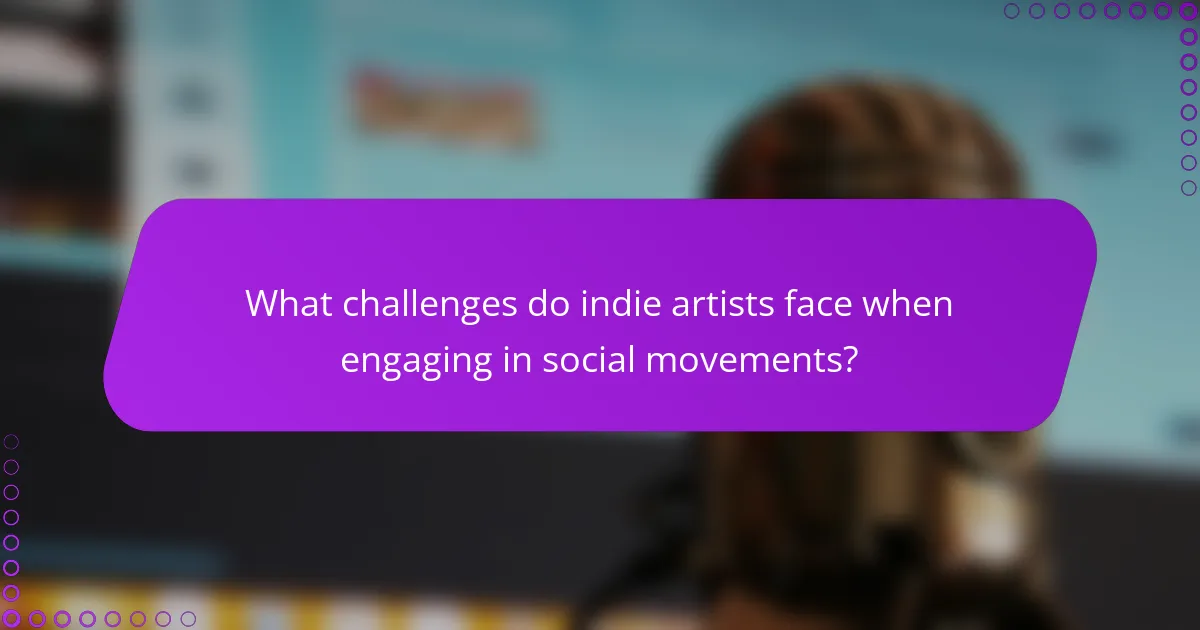
What challenges do indie artists face when engaging in social movements?
Indie artists face significant challenges when engaging in social movements. These include limited resources, lack of mainstream visibility, and balancing artistic integrity with commercial pressures.
Many indie musicians operate on tight budgets, restricting their ability to promote social causes effectively. Additionally, they often struggle to reach larger audiences, which can dilute their messaging.
Moreover, the pressure to conform to commercial expectations can hinder their authentic expression of social issues. This tension can lead to conflicts between personal beliefs and market demands.
Ultimately, the unique attributes of indie music, such as its grassroots nature, can also empower artists to connect deeply with specific communities, fostering meaningful engagement in social movements.
How do funding and support affect indie artists’ activism efforts?
Funding and support significantly enhance indie artists’ activism efforts by providing essential resources and visibility. Financial backing allows artists to create impactful projects, while support networks amplify their messages. For instance, grants and sponsorships enable the production of socially conscious music that addresses pressing issues. Additionally, collaborations with organizations can broaden outreach and engagement, fostering community involvement. This synergy between funding and activism empowers indie artists to drive social change effectively.
What are the risks associated with political expression in indie music?
Political expression in indie music carries risks such as censorship, backlash, and alienation of audiences. Artists may face scrutiny for their views, leading to potential loss of support. In some cases, political messages can provoke legal actions or threats from authorities. The unique attribute of indie music’s grassroots nature allows for diverse voices but also exposes artists to rare instances of severe consequences. As a result, many indie musicians navigate these risks carefully, balancing their message with their career sustainability.
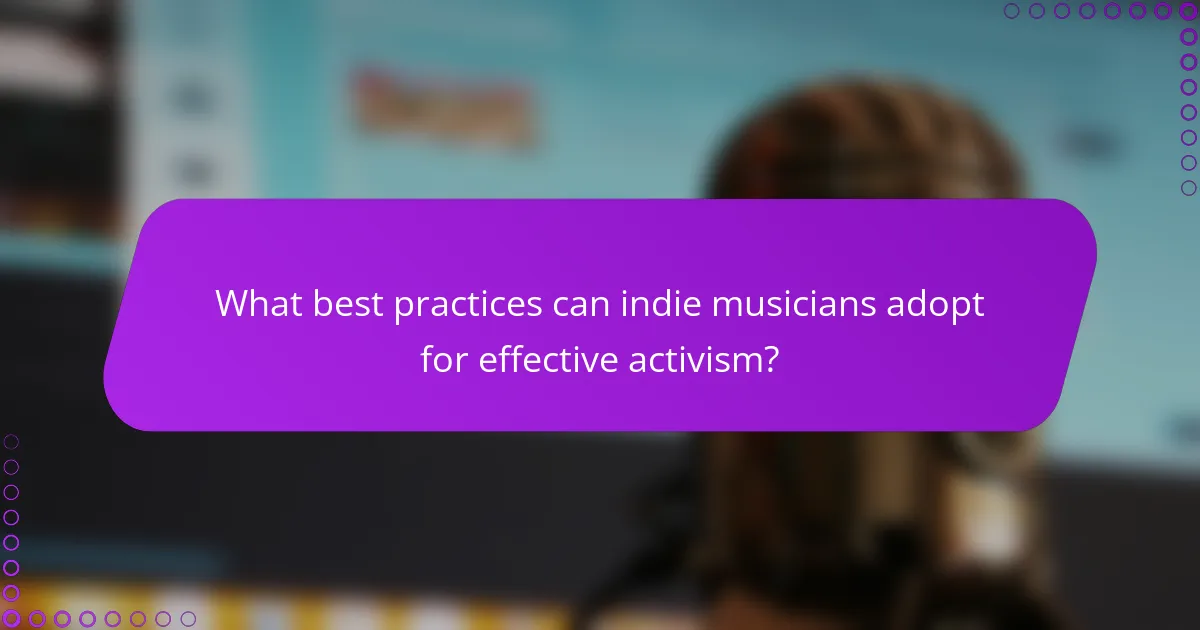
What best practices can indie musicians adopt for effective activism?
Indie musicians can adopt several best practices for effective activism. They should leverage their platforms to raise awareness about social issues, engage with their audience through social media, and collaborate with like-minded artists.
Additionally, musicians can participate in community events, use their music to convey messages, and support local organizations. By integrating activism into their music, they can inspire change and foster a sense of community. Engaging in these practices not only amplifies their voices but also strengthens their connection with fans and causes.
How can collaborations enhance the impact of indie music on social movements?
Collaborations can significantly enhance the impact of indie music on social movements by amplifying voices and reaching wider audiences. Collaborative efforts between indie artists and social activists create powerful platforms for advocacy. For instance, partnerships can lead to unique events that blend music with activism, drawing attention to critical issues.
Furthermore, collaborations often combine diverse musical styles and perspectives, enriching the narrative surrounding social movements. This fusion can inspire listeners and motivate them to engage in activism. Notable examples include benefit concerts that raise funds and awareness for various causes, demonstrating the unique ability of indie music to mobilize communities.
Additionally, social media plays a crucial role in promoting these collaborations, allowing for rapid dissemination of messages and fostering grassroots movements. The synergy between indie music and social causes can create a rare cultural phenomenon, where art and activism intersect to drive change.
What strategies can indie artists use to engage their audience in activism?
Indie artists can engage their audience in activism through storytelling, collaboration, and social media. They can share personal narratives that resonate with social issues, fostering a deeper connection. Collaborating with activists or organizations amplifies their message and extends their reach. Utilizing social media platforms allows for real-time engagement and mobilization, encouraging fans to participate in causes. These strategies not only enhance audience involvement but also strengthen the artist’s brand identity within social movements.
